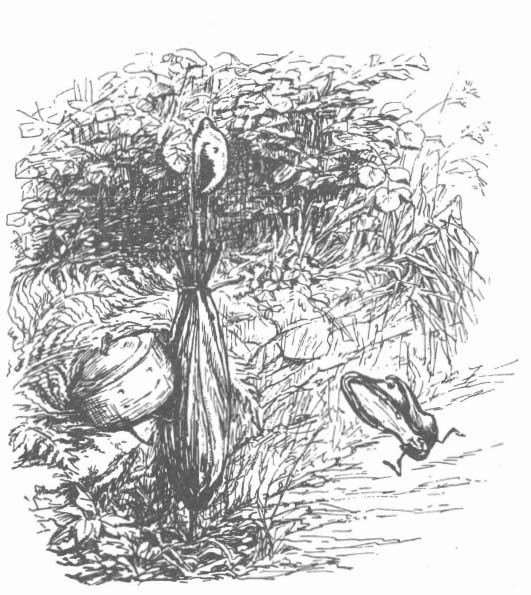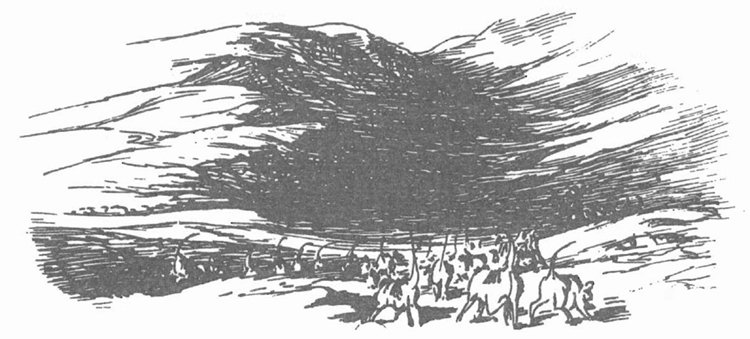

The smithy was all aglow with a roaring fire on the hearth. Sparks were flying. Hot firelight flickered on the rafters overhead. It shone upon a crowd of dogs and horses, and upon the gypsies’ donkey, Cuddy Simpson, who was dozing in a corner. His head drooped; he rested a strained fetlock wearily. Dogs barked; horses stamped; there was even the merry feedle tweedle of a fiddle, to which the collies, Meg, and Fly, and Glen warbled a treble chorus. And through all the din sounded the tap, tap, tap! of Mettle’s little hammer on the anvil, and the creaking of the bellows that another dog was blowing. The dog was Eddy Tinker, the gypsy lurcher; and the band-hold of the bellows was made of a polished ox-horn. ‘Welcome, Pony Billy! but wait for Cuddy Simpson. He has cast a foreshoe, and he is lame and weary. Wait till I fit him with fairy shoes that will make him as lish as new legs. That’s why the donkeys never die! They know the road to the fairy smithy!’ ‘I can wait,’ said Pony Billy, who was fond of Cuddy Simpson.
Creak, creak! went the bellows, keeping time to the tune of Black Nag. Louder still barked the dogs, and the horses stamped on the floor. They talked of the good old days, when roads were made for horses, ‘None of this tarry asphalt like a level river of glass; none of this treacherous granite where we toil and slip and stumble, dragged backward by our loads. None of these hooting lorries that force us against the wall. Shrieking, oily, smelly monsters! and everybody has one – the butcher, the baker, the candlestick maker – even the fisherman and the farmer. Where are the patient horses? Where is butcher’s Ginger? and fishcart Fanny? and baker’s Tommy? Where is the hog-maned mare with the shrapnel marks? Gone, gone – all gone.
Queeny Cross, I, poor old mare, am the last nag left in a huckster’s cart. But happen you like them, Mettle? you that work amongst iron and nails and bolts?’
‘I like them?’ snarled Mettle, banging the hammer on the anvil, ‘I like those snorting juggernauts? I hate them as much as you do, old Queen. They run over us dogs; they lame our cattle; they kill our sheep.’ (Ragman and Roy growled low.) ‘Think of the noble horses in the grand old days of the road! Who needed a starting handle? Who required to wind up a thoroughbred? Breed – give me breed!’ barked Mettle, ‘Will-Tom’s team in the Coniston coach for me! Now it’s rattle, rumble, rattle, rattle, shriek, shriek, shriek! Gone are the pleasant jog-trot days of peace. They have ruined the smithies and stolen the roads. Shame upon the Big Folks!’ said Mettle, banging on the anvil, ‘even Mistress Heelis – her that was so fond of ponies – serve her right to lose her clog!’ ‘Where did she lose it, Mettle?’ ‘Nay, that is a mystery! It seemed to have clog danced right away and back. It came home by Hawkshead and it had been to Gray thwaite. As to the how –’ (here Mettle interrupted his story to throw a shovelful of small coal onto the hearth) – ‘as to the how she came to lose it, it was this a-way. She had been on a long, long journey in one of these here rattletraps; and when she got home and unpacked her luggage, she left her clogs upon the shelf.’ ‘What shelf was that, Mettle?’ ‘What the Big Folk that ride in motors call a “footboard”, quite appropriate for clogs. When the car went forth next morning there sat the pair of clogs, still upon the footboard. They looked proud.’ ‘One thing surprises me,’ interrupted white collie Fan, ‘does Mistress Heelis really ever take her clogs off? I thought she went to bed in them?’ ‘They were off that day, sure,’ said Mettle, leaning on the bellows handle, ‘I saw them pass the smithy. They grinned at me; their buckles winked. But when the car came home in the afternoon, there was only one clog on the footboard, sitting by itself. The other one had fallen off.’ ‘Which foot’s clog was it, Mettle?’ ‘Her best foot that she puts foremost. She was sad. She inquired all over for her right-foot clog; and she put a notice – LOST, A CLOG – in the window of the village shop. The clog came home again after a while. My word! It had seen some fun. Now it happened this a-way,’ continued Mettle, turning the donkey shoe with the tongs, and blowing white flame through the small coal, ‘it happened this way. The car took the bumpy road through the woods by Eesbridge. The clogs joggled on the footboard; joggled and giggled and nudged each other with their elbows; until – bump, bump, bump! over a rise of the road, they came in sight of Joshy Campbell’s tin-can-dinner-box and his big green gingham umbrella.

Through all the din sounded the tap, tap, tap! of Mettle’s little hammer on the anvil.
‘Joshy was an old man with a reddish gray beard, who tidied the sides of the roads. Always took out with him his tin-can-dinner-box, and his great big bunchy umbrella. I never saw him use his umbrella; he carried it always rolled up, to keep it out of the rain. All day, while Joshy worked, the umbrella sat by the dyke, bolt upright and serious, with a long, curved, hooky nose. And snuggled up beside it sat the dumpy tin-can-dinner-box. When the clogs saw the umbrella they bounced up with a shout – who-op! The left-foot clog bounced back upon the board and continued to joy-ride; but the right-foot clog bounced right off. It bounced onto the road and ran back – back, back, back! back to old Joshy Campbell’s umbrella. The umbrella made a bow and stepped out of the ditch; the dinner-box made a bob; the clog made a gambol; and away down the road they all ran, hoppitty hop! without ever a stop, stoppitty stop! or the slightest consideration for old Joshy Campbell. They ran and they ran, and they hopped and they hopped. For a mile or two they ran, and it was night before they stopped.’ Mettle drew the coal over the donkey shoe with a little colrake, and plied the bellows.
‘Where did they hop to, and stop at, Mettle?’ ‘They hopped as far as the middle of the great wood. It was darkish; but they could see to follow the woodland track. For a long, long way they followed it, winding amongst the bushes; until at length before them in the distance they saw a pool of light. It was silvery, like moonlight; only it was always streaming upwards; up from the ground, not downwards from the sky above. The shining space was level, like the floor of a great pit-stead; it shone like a moonlit mere.
‘And on that shining floor were dancers – strange dancers they were! Hundreds of filmy glittering dancers, dancing to silvery music; thousands of tinkling, echoing murmurs from silver twigs and withered leaves. And still from the dance floor a white light streamed, and showed the dancing shoes that danced thereon – alone.

The umbrella made a bow and stepped out of the ditch.
‘They tell me that in France there is a palace – a fairy palace; and in that court, long mournful and deserted, there is a Hall of Lost Footsteps, the Salle des Pas Perdus, where ghosts dance at night. But this dance amongst the oak-woods was a dance of joyous memories. If no feet were in the footgear, the shoes but danced more lightly. And what shoes were not there? Shoes of fact and fable! Queen amongst the dancers was a tiny glass slipper – footing it, footing it – in minuet and stately gavotte. She danced with a cavalier boot; a high boot with brown leather top. Step it, step it, high boot! Step it, little glass slipper! The chimes will call you at midnight; “Cinderella’s carriage stops the way! Room for the Marquis, the Grand Marquis of Carabas! Make way for Puss-in-Boots!” These two danced one-and-one; but beside them danced a pair – Goody-two-shoes’ little red slippers. How they did jet it, jet it, jet it in and out! And round about them danced other shoes, other shoes dancing in hundreds. Broad shoes of slashed cloth; and long-toed shoes with bells, that danced the milkmaid’s morris; buckled shoes, and high-heeled shoes; jack-boots, and buskins, and shoes of Spanish leather, and pumps and satin sandals that jigged in and out together.
‘And round about them – clump, clump, clump! – danced Mistress Heelis’ clog, clog dancing like a good one, with Joshy Campbell’s dinner-box and the tall green gingham umbrella!
‘Only those two were different; all the other dancers were shoes; and the main of them were horseshoes – shoes of all the brave horses that ever were shod, in the good old days of the road. There were little shoes of galloways, and light shoes of thoroughbreds, and great shoes of Clydesdales; and the biggest were the wagoners! On they came galloping, Ha halloo! Ha halloo! (Brill, the foxhound, lifted up her voice – Ha halloo, ha halloo!) – galloping, galloping, Black Nag come galloping! Hark to the timber wagons thundering down the drift road!’ shouted Mettle, banging on the anvil, ‘hark the ringing music of the horseshoes – here’s –
“Tap, tap, tappitty! trot, trot, trod!
Sing Dolly’s little shoes, on the hard high road!
Sing Quaker Daisey’s sober pace,
Sing high-stepping Peter, for stately grace.
Phoebe and Blossom, sing softly and low, dear dead horses of long ago;
Jerry and Snowdrop; black Jet and brownTom and Cassandra, the pride of the town;
Bobby and Billy gray, Gypsy and Nell;
More bonny ponies than I can tell;
Prince and Lady, Mabel and Pet;
Rare old Diamond, and Lofty and Bet.”‘Now for the wagoners! Hark to the trampling of the wagoners!’ shouted Mettle, banging on the anvil – ‘here’s –
“Dick, Duke, Sally, and Captain true,
Wisest of horses that ever wore shoe,
Shaking the road from the ditch to the crown,
When the thundering, lumbering larch comes down.”
‘Ah, good old days! ah, brave old horses! Sing loud, sing louder, good dogs!’ barked Mettle, ‘sing, Pony Billy; sing up old Queenie, thou last of the nags! Sing the right words, dogs, none of that twaddle! Now sing all together; Keep time to the bellows –
“D’ye ken John Peel with his coat so gray?
D’ye ken John Peel at the break of day?
D’ye ken John Peel when he’s far, far away,
With his hounds and his horn in the morning.‘Twas the sound of his horn call’d me from my bed.
And the cry of his hounds has me oft times led;
For Peel’s view halloa would ’waken the dead,
Or a fox from his lair in the morning.”
Louder and merrier rose the hunting chorus, floating round the rafters with the eddying smoke from the forge. Till the Big Folk, that slept up above in Anvil Cottage, turned on their feather beds and dreamed that they were fox hunting.
